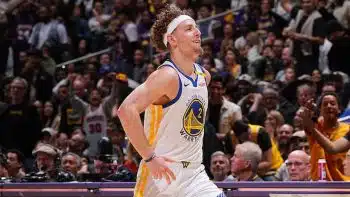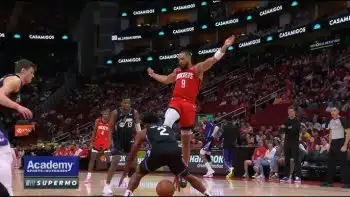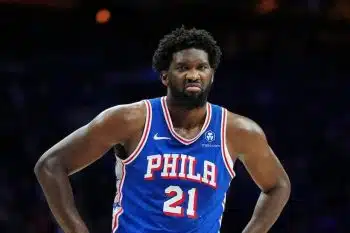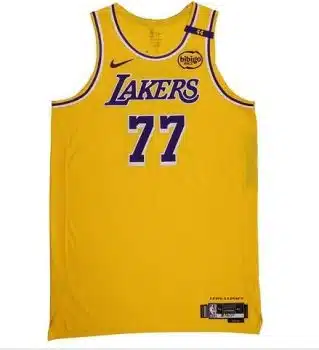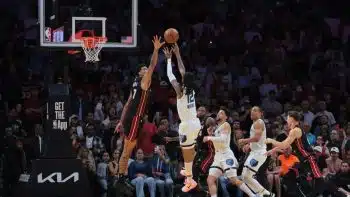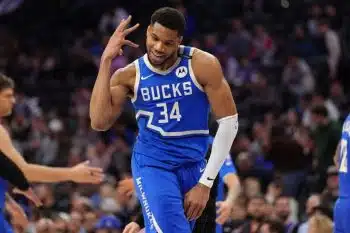NBA
NBA PM: Garnett, Neal Helping Young Wolves
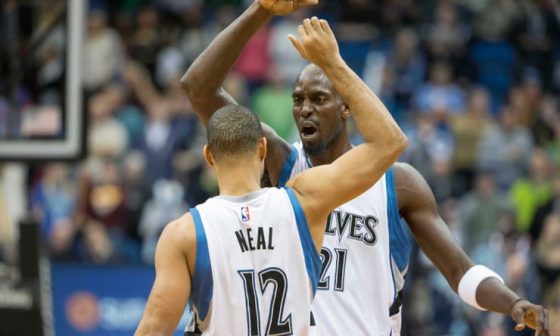
Garnett, Neal Helping Young Wolves
Kevin Garnett and Gary Neal were mentioned in quite a few rumors in the weeks leading up to the NBA’s Feb. 19 trade deadline. A number of playoff teams pursued the two veteran players in hopes of strengthening their roster for a postseason run.
But rather than being traded to contenders, both players ended up on the Minnesota Timberwolves – a team that currently has the worst record in the Western Conference and one of the youngest rosters in the NBA. The Wolves parted ways with Thaddeus Young to land Garnett and moved Mo Williams and Troy Williams to acquire Neal (and a second-round pick). That’s because Flip Saunders, the team’s head coach and president of basketball operations, felt it was important for Minnesota’s young core to be surrounded by strong veteran leaders who could help their growth.
As members of the Brooklyn Nets and Charlotte Hornets, Garnett and Neal were battling for the eighth seed in the Eastern Conference. Now, they have focused their attention on leading the Wolves on and off the court and helping their developing teammates reach their full potential.
It didn’t take long for Garnett, 38, and Neal, 30, to make their presence felt in Minnesota. After winning just 11 of their first 53 games, the Wolves have had three quality wins in recent weeks – beating the Phoenix Suns, Washington Wizards and Portland Trail Blazers.
“We’re a young team, but now we’ve got a lot of experience with KG and Gary Neal and the experience is going to help the young guys [learn] what this league is about,” Ricky Rubio told reporters.
“I think we’re talking more on defense and we’re being more aggressive.”
“[We have] a lot more energy, a lot more intensity,” Zach LaVine added in an interview with Timberwolves.com. “Everybody is ready to play. We’re getting here early and it’s just a different mindset.”
From day one, Garnett’s message to his young teammates was “be vocal” and they have listened. The players say that the team is communicating more on both ends of the floor and credit the 15-time All-Star for that change. Andrew Wiggins believes Garnett’s talking and teaching have been huge for the Wolves.
“He’s always talking – on offense and on defense – to make the game easier,” Wiggins told Timberwolves.com when asked about Garnett’s impact on the team. “He is the first one in to practice and works hard. He’s talking and showing a lot of leadership. He’s shown a lot of stuff by example.
“He’s affected everything – off the court and on the court. He’s made everybody go harder and work harder. Our defense has been more polished just from him talking on the bench and on the court. It’s good having him on the court. It all rubs off on us.”
As Wiggins mentioned, Garnett is trying to lead by example as well as with his words. When trying to teach a group that includes some players nearly half his age, Garnett believes this is important.
“It’s not just telling them, but showing them how,” Garnett told Timberwolves.com. “When you have this much raw talent, like they have here, it’s important to not only give instructions but to demonstrate.”
It’s clear that the team wants to learn from the future Hall of Famer. Garnett’s screaming could’ve fallen on deaf ears, but fortunately the Wolves’ young players are listening to everything he says.
“He’s a coach on the floor,” Wiggins said. “He’s telling us what is happening on the floor and what we can do better. He’s teaching us, and we’re all listening. We’re his students.”
Garnett appreciates that the team is willing to accept his lessons and advice. Players like Wiggins and LaVine were only a few months old when Garnett began his NBA career, so they grew up watching him and have a ton of respect for what he’s been able to accomplish.
“This is a team that will listen and give you [everything] they have,” Garnett said. “That’s a big plus right there.
“These kids have the skills that got them here and I’m just trying to give them the little things, the small things, that only basketball players who have been in the league for a long time know.”
Garnett has tried to help his new teammates with everything from on-court adjustments to game day routines. Rubio said that prior to games, Garnett is locked in all day because “the game starts when you wake up” and “your mind has to be set for that night.” This means focusing solely on winning that game and limiting distractions, which is why Saunders said that the young players were warned to never be on their cell phone in the locker room before a game because Garnett is known to throw devices in the toilet.
While Garnett’s homecoming has obviously made more headlines than the acquisition of Neal, adding the veteran shooting guard was a very important move for Minnesota as well.
Neal has provided instant offense off of the Wolves’ bench, and has averaged 18.8 points over the last four games. On Saturday, he had 27 points in 21 minutes on 8-of-11 shooting from the field to help Minnesota defeat Portland in a 122-113 shootout.
“He’s a good shooter, he knows how to play and he’s strong,” Saunders told reporters when asked about Neal’s contributions. “We traded for him and all of the ‘experts’ – you guys [in the media] – thought we were going to buy him out. But I said from day one that we weren’t going to buy him out.
“We traded for him [because] we thought he’s a good player and might have a future here. We wanted to bring him in, let him play with our guys and see how he could blend with our players to see if he could be part of our future. I like that he can make shots, he doesn’t shy away from big-game moments and he’s a good influence on our young players.
“He is helping a lot, he’s a tough guy,” Rubio added when asked about Neal’s contributions. “He knows how to play, is smart, intelligent and helping a lot.”
Like Garnett, Neal is trying to help Minnesota build a winning culture. Remember, the veteran guard spent his first three NBA seasons with the San Antonio Spurs and he has played in 45 postseason games throughout his career. He knows what it takes for a team to go on a deep postseason run and experience success, which is one reason Saunders felt he’d be an excellent piece to add.
Without Garnett and Neal, Minnesota’s roster has an average age of 22.3 years old, which would be the youngest in the NBA by far. With the two veterans, that average climbs to 25.7. Garnett and Neal have been tasked with taking a very young team and helping them grow into one of the NBA’s top up-and-coming teams so that they can reach their full potential and eventually break the Timberwolves’ current 11-year playoff drought.
However, it remains to be seen how long Garnett and Neal will be in Minnesota. Both players will be unrestricted free agents this summer and there’s no guarantee that the Wolves will be able to keep them, even though Saunders seems to want both players back. Because Garnett and Neal could leave, some analysts criticized the decision to acquire the two veterans, stating that Minnesota should’ve instead dealt Young and Williams for more young talent or draft picks to help their rebuilding effort. Saunders received similar criticism for adding a veteran rather than a draft pick last summer, when he chose to acquire Young instead of a first-round pick as part of the three-way Kevin Love deal with the Cleveland Cavaliers and Philadelphia 76ers.
Garnett may re-sign, as it’s possible he wants to finish his career in Minnesota (and he has expressed interest in being part of an ownership group that buys the franchise at some point in the future). However, it’s also possible that the 20-year veteran will end his playing career since he has seriously considered retirement over the last few summers.
Neal may leave to join a contender, as most 30-year-old players who have experienced postseason success would rather play for a winner than be part of a rebuilding effort. And there’s no doubt contending teams will come calling this summer, just as they pursued him prior to the trade deadline.
If both players leave, Kevin Martin would be the lone player on the Timberwolves’ roster who is age 30 or older. That means Minnesota’s franchise cornerstones like Wiggins, Rubio and LaVine need to learn as much as they can from Garnett and Neal this season, since it’s unclear how long they’ll be around. The young core seems to understand this, with Wiggins recently saying that the team is learning things they can use long after Garnett and Neal are gone.
If all goes according to Saunders’ plan, the Wolves’ youngsters will be yelling at each other on defense, putting away their phones in the locker room and waking up thinking solely about winning for years to come, whether Garnett and Neal are playing alongside them or not.
HEAT Sign Beasley to Second 10-Day Deal
The Miami HEAT have signed Michael Beasley to a second 10-day contract, the team announced. He inked his first 10-day deal on Feb. 26 and this is the final 10-day deal that Beasley can sign.
After this contract expires, Miami must sign him for the remainder of the season or let him go. It seems likely that the HEAT will keep him for the rest of the year, as he has played well for Miami thus far.
Through six games, the 26-year-old has averaged 10.5 points and 4.2 rebounds in 23.7 minutes per game. He is shooting 44.6 percent from the field since joining the HEAT.
He has been playing significant minutes since Miami has been depleted due to injuries. His versatility has really helped the team since he has been able to play multiple positions (even logging some minutes at center in a small-ball lineup).
If Miami keeps Beasley, he would be the third 10-day player that they went on to sign for the whole season, joining Tyler Johnson and Henry Walker.
HEAT head coach Erik Spoelstra recently talked about trusting Beasley since this is his third stint in Miami and the two men have grown close.
“I feel very comfortable with Mike,” Spoelstra said, according to the Miami Herald. “We have gotten to know each other extremely well over the years. We felt it was a no-brainer [to sign him]. We’ve been running the majority of our offense through him, ala Chris Bosh. He’s a close facsimile in our system… He’s shown great strides in his competitiveness, technique, consistency.”
Prior to signing with Miami, Beasley played for the Shanghai Sharks of the Chinese Basketball Association. In his 37 games overseas, he averaged 27.1 points, 10.4 rebounds, 5.2 assists and 1.92 steals while shooting 51.3 percent from the floor.
